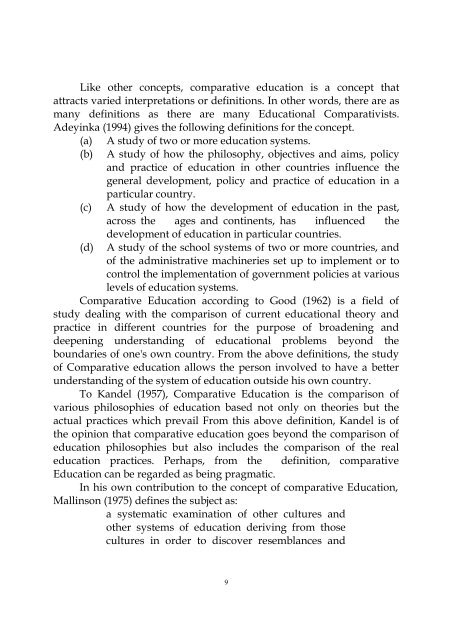edu 304 - comparative education - National Open University of Nigeria
edu 304 - comparative education - National Open University of Nigeria
edu 304 - comparative education - National Open University of Nigeria
You also want an ePaper? Increase the reach of your titles
YUMPU automatically turns print PDFs into web optimized ePapers that Google loves.
Like other concepts, <strong>comparative</strong> <strong>edu</strong>cation is a concept that<br />
attracts varied interpretations or definitions. In other words, there are as<br />
many definitions as there are many Educational Comparativists.<br />
Adeyinka (1994) gives the following definitions for the concept.<br />
(a) A study <strong>of</strong> two or more <strong>edu</strong>cation systems.<br />
(b) A study <strong>of</strong> how the philosophy, objectives and aims, policy<br />
and practice <strong>of</strong> <strong>edu</strong>cation in other countries influence the<br />
general development, policy and practice <strong>of</strong> <strong>edu</strong>cation in a<br />
particular country.<br />
(c) A study <strong>of</strong> how the development <strong>of</strong> <strong>edu</strong>cation in the past,<br />
across the ages and continents, has influenced the<br />
development <strong>of</strong> <strong>edu</strong>cation in particular countries.<br />
(d) A study <strong>of</strong> the school systems <strong>of</strong> two or more countries, and<br />
<strong>of</strong> the administrative machineries set up to implement or to<br />
control the implementation <strong>of</strong> government policies at various<br />
levels <strong>of</strong> <strong>edu</strong>cation systems.<br />
Comparative Education according to Good (1962) is a field <strong>of</strong><br />
study dealing with the comparison <strong>of</strong> current <strong>edu</strong>cational theory and<br />
practice in different countries for the purpose <strong>of</strong> broadening and<br />
deepening understanding <strong>of</strong> <strong>edu</strong>cational problems beyond the<br />
boundaries <strong>of</strong> one's own country. From the above definitions, the study<br />
<strong>of</strong> Comparative <strong>edu</strong>cation allows the person involved to have a better<br />
understanding <strong>of</strong> the system <strong>of</strong> <strong>edu</strong>cation outside his own country.<br />
To Kandel (1957), Comparative Education is the comparison <strong>of</strong><br />
various philosophies <strong>of</strong> <strong>edu</strong>cation based not only on theories but the<br />
actual practices which prevail From this above definition, Kandel is <strong>of</strong><br />
the opinion that <strong>comparative</strong> <strong>edu</strong>cation goes beyond the comparison <strong>of</strong><br />
<strong>edu</strong>cation philosophies but also includes the comparison <strong>of</strong> the real<br />
<strong>edu</strong>cation practices. Perhaps, from the definition, <strong>comparative</strong><br />
Education can be regarded as being pragmatic.<br />
In his own contribution to the concept <strong>of</strong> <strong>comparative</strong> Education,<br />
Mallinson (1975) defines the subject as:<br />
a systematic examination <strong>of</strong> other cultures and<br />
other systems <strong>of</strong> <strong>edu</strong>cation deriving from those<br />
cultures in order to discover resemblances and<br />
9
















